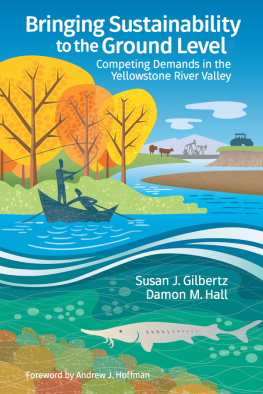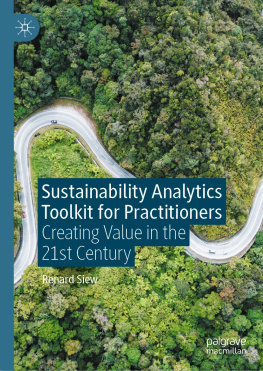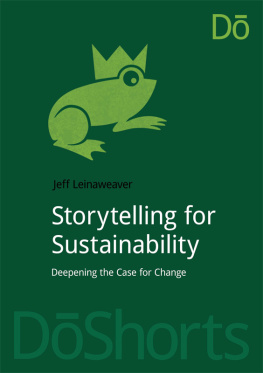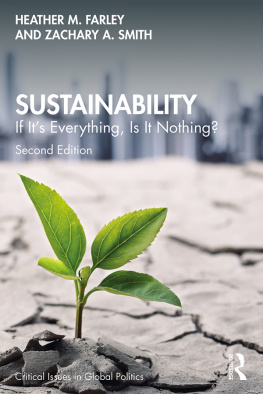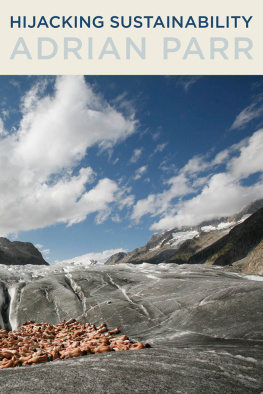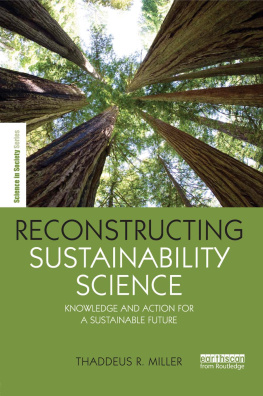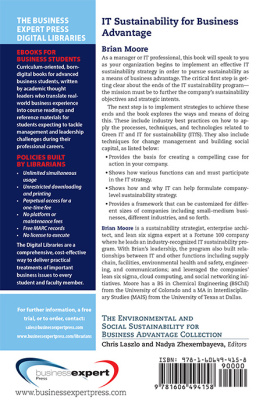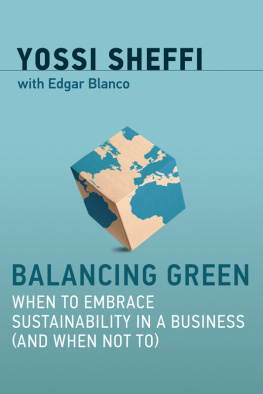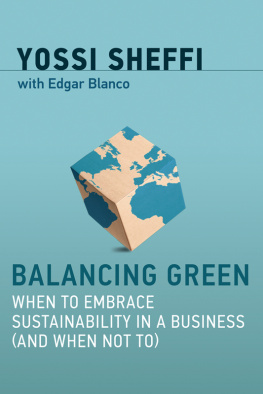Bringing Sustainability to the Ground Level
Bringing Sustainability to the Ground Level
Competing Demands in the Yellowstone River Valley
Susan J. Gilbertz and Damon M. Hall

Bringing Sustainability to the Ground Level: Competing Demands in the Yellowstone River Valley
Copyright Business Expert Press, LLC, 2022.
Cover design by Divya Pidaparti, Artwork by Heins Creative Inc., Billings, MT.
Interior design by Exeter Premedia Services Private Ltd., Chennai, India
All rights reserved. No part of this publication may be reproduced, stored in a retrieval system, or transmitted in any form or by any meanselectronic, mechanical, photocopy, recording, or any other except for brief quotations, not to exceed 400 words, without the prior permission of the publisher.
First published in 2022 by
Business Expert Press, LLC
222 East 46th Street, New York, NY 10017
www.businessexpertpress.com
ISBN-13: 978-1-63742-147-5 (paperback)
ISBN-13: 978-1-63742-148-2 (e-book)
Business Expert Press Environmental and Social Sustainability for Business Advantage Collection
Collection ISSN: 2327-333X (print)
Collection ISSN: 2327-3348 (electronic)
First edition: 2022
10 9 8 7 6 5 4 3 2 1
For Ken.
For Lindsay and Felix.
And for the people of the Yellowstone River Valley past, present, and future.
Description
Using the iconic Yellowstone River Valley of Montana as a case setting, this book is perfect for students with limited prior understanding of sustainability issues, theory, or science. The case explains how economic, environmental, and social concerns are threaded together as challenges that communities face when they imagine their long-term futures. Readers with business interests will appreciate the attention given to issues involving long-term profitability, while natural resource managers will appreciate the discussions of physical processes and nonhuman species. Others will be interested in the discussions of public policy concerns, including water law and endangered species. The case also intersects with interests of American Indians, especially concerning historical water rights. While useful and practical understandings of sustainability concepts are stressed, the details of the case expose complexities associated with improving community resilience. The authors give attention to how the valleys people express sustainability concerns, and readers are likely to recognize similar concerns in watersheds where they live. The case can, thus, function as a first step in a scaffolded curriculum designed to move students from understanding complexity into data gathering, analyses, and decision making. It provides platforms for exploring practical, theoretical, and scientific issues as linked exercises or as advanced projects. The case can also be used as a catalyst for identifying dozens of career trajectories. The National Science Foundation provided funding to pilot a similar version of this text, and the majority of the content has been empirically tested for its ability to connect STEM-based analyses to sustainability questions.
Keywords
sustainability; economic well-being; agriculture; tourism; oil and gas development; fracking; hydraulic fracturing; environmental well-being; cottonwood forests; Pallid Sturgeon; endangered species; social well-being; fairness; environmental justice; resilience; sustainable development; sustainability science; Native American; American Indian water rights; water law
Contents
Gilbertz and Hall offer an engagingly written tour de force. The book is well-researched and rich in local voices. I have worked in the Yellowstone area, and studied sustainability, and came away with fresh insights about the dizzying array of issues, actors, and land uses in the watershed. They get place right and avoid being parochial, by connecting local/regional phenomena to larger principles and extra-local forces.Richard C. Stedman, PhD, Professor and Chair, Department of Natural Resources and the Environment, Cornell University, Associate Director of the Cornell Center for Conservation Social Sciences, and Faculty Fellow at the Cornell Atkinson Center for Sustainability
This excellent book is an accessible and compelling way for students to understand the interconnected social, economic, and environmental dimensions of sustainability that communities are facing around the world. With descriptions of the complex practical challenges and opportunities of the Yellowstone River Valley based on hundreds of interviews with local people, Gilbertz and Hall demonstrate the legacy of environmental injustice and inequities while inspiring change through sustainability science and collective action.Jennie C. Stephens, PhD, Professor of Sustainability Science & Policy, Northeastern University, and author of Diversifying Power: Why We Need Antiracist, Feminist Leadership on Climate and Energy (2020).
Finally, a comprehensive and in-depth case study that illustrates all of the threads of sustainability in a compelling context. Students will be able to grasp the interconnected complexities and challenges of sustainability because the authors weave a relevant and wellresearched narrative. This case study is an ideal teaching tool because it provides a seamless entry point to explore important concepts further and make applications to other, similar and maybe even more familiar situations.Jes Thompson, PhD, Professor, College of Business and Co-Director, SISU: The Innovation Institute at Northern Michigan University.
Sustainability of place is the most relevant and resilient approach to creating sustainable systems. Gilbertz and Hall have created a masterpiece of regional sustainable planning, beginning with the people in a place. The complexity of the Yellowstone River Valley may seem exotic, but encompasses many of the same challenges of sustainability of Southern California or the Maharashtra state of India. Competing cultural, economic, social, and environmental demands drive complex decisions that can either erode or restore ecosystems upon which all other interests depend. How we understand and navigate these differences determines the outcome.
The very personal level of engagement of the people of the Yellowstone River Valley provides the texture and tone that define the potential for common purpose. Gilbertz and Hall demonstrate that the voices of the residents in a place contain collective wisdom. Their description of water conflict very effectively framed water as the common blood of communities that defines future resiliency, and the source of blood feuds that divide communities for generations.
The challenges of conflicting cultural values emerges as the primary theme of this remarkable work by Gilbertz and Hall. Sustainability is, as they clearly define it, about how we live together now and into the future. By exploring the challenges the people of the Yellowstone River Valley face living in a place together, and identifying pathways to reconciliation, they offer real lessons for sustainability that apply to our communities as well. This book is a model for how regional sustainability planning should be approached.Marty D. Matlock, PhD, PE, BCEE, Professor of Ecological Engineering in the Biological and Agricultural Engineering Department at the University of Arkansas and Executive Director, University of Arkansas Resiliency Center

